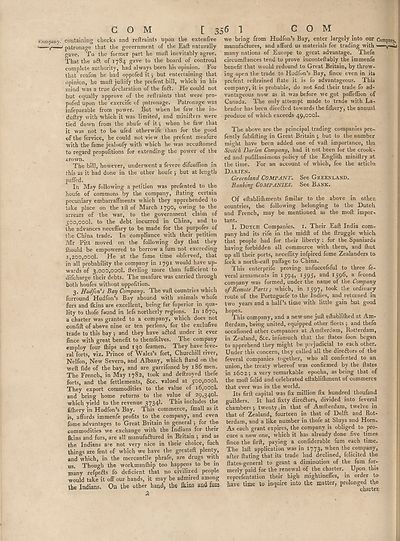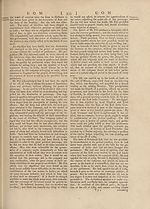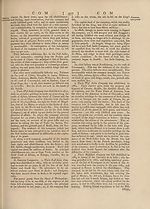Encyclopaedia Britannica, or, a Dictionary of arts, sciences, and miscellaneous literature : enlarged and improved. Illustrated with nearly six hundred engravings > Volume 6, CHI-Crystallization
(374) Page 356
Download files
Complete book:
Individual page:
Thumbnail gallery: Grid view | List view

COM [ 356 1 COM
Company, containing checks and reftraints upon the extenfive
'«*—patronage that the government of the Eaft naturally
gave. To the former part he muft inevitably agree.
That the aft of 1784 gave to the board of controul
complete authority, had always been his opinion. For
that reafon he had oppofed it j but entertaining that
opinion, he muft juftify the prefent bill, which in his
mind was a true declaration of the faft. Fie could not
but equally approve of the reftraints that were pro^
pofed upon the exercife of patronage. Patronage was
infeparable from power. But when he faw the in-
duftry with which it was limited, and minifters were
tied down from the abufe of it ; when he faw that
it was not to be ufed otherwife than for the good
of the fervice, he could not view the prefent meafure
with the fame jealoufy with which he was accuftomed
to regard propofttions for extending the power of the
crown.
The bill, however, underwent a fevere difcuffion in
this as it had done in the other houfe ; but at length
paCTed.
In May following a petition was prefented to the
houfe of commons by the company, ftating certain
pecuniary embarraffrnents which they apprehended to
take place on the ift of March 1790, owing to the
arrears of the war, to the government claim of
500,000!. to the debt incurred in China, and to
the advances neceffary to be made for the purpofes of
the China trade. In compliance with their petition
Mr Pitt moved on the following day that they
Ihould be empowered to borrow a fum not exceeding
1,200,0001. He at the fame time obferved* that
in all probability the company in 1791 would have up-
wards of 3,000,000!. fterling more than fufficient to
difcharge their debts. The meafure was carried through
both houfes without oppofttion.
3. Hudfon’s Bay Company. The vaft countries which
furround Hudfon’s Bay abound with animals whofe
furs and fkins are excellent, being far fuperior in qua¬
lity to thofe faund in lefs northerly regions. In 1670*
a charter was granted to a company, which does not
confift of above nine or ten perfons, for the exclufive
trade to this bay; and they have afted under it ever
fince with great benefit to themfelves. I he company
employ four (hips and 130 feamen. They have feve-
ral forts, viz. Prince of Wales’s fort, Churchill river,
Nelfon, New Severn, and Albany, which fland on the
weft fide of the bay, and are garrifoned by 186 men.
The French, in May 1782, took and deftroyed thefe
forts, and the fettlements, &c. valued at 500,000k
They export commodities to the value of i6,oooL
and bring home returns to the value of 29,340k
which yield to the revenue 3734k This includes the
filhery in Hudfon’s Bay. This commerce, fmall as it
is, affords immenfe profits to the company, and even
fome advantages to Great Britain in general j for the
commodities we exchange with the Indians for their
flcins and furs, are all manufaftured in Britain j and as
the Indians are not very nice in their choice, fuch
things are fent of which we have the greateft plenty,
and which, in the mercantile phrafe, are drugs with
us. Though the workmanfhip too happens to be in
many refpefts fo deficient that no civilized people
would take it off our hands, it may be admired among
th© Indians. On the other hand, the ikins and fins
7i
we bring from Hudfon’s Bay, enter largely into our Company,
manufaftures, and afford us materials for trading with v ^1
many nations of Europe to great advantage. Thefe
circumftances tend to prove inconteftably the immenfe
benefit that would redound to Great Britain, by throw¬
ing open the trade to Hudfon’s Bay, fince even in its
prefent reftrained ftate it is fo advantageous. This
company, it is probable, do not find their trade fo ad¬
vantageous now as it was before we got poffeflion of
Canada. The only attempt made to trade with La¬
brador has been direfted towards the fifhery, the annual
produce of which exceeds 49,000k
The above are the principal trading companies pre-
fently fubfifting in Great Britain \ but to the number
might have been added one of vaft importance, the*
Scotch Darien Company, had it not been for the crook,
ed and pufillanimous policy of the Englifh miniftry at
the time. For an account of which, fee the articles
Darien.
Greenland Company. See Greenland.
Banking COMPANIES. See Bank.
Of eftablifliments fimilar to the above in other,
countries, the following belonging to the Dutch
and French, may be mentioned as the moft impor¬
tant.
I. Dutch Companies. 1. Their Eaft India com¬
pany had its rife in the midft of the ftruggle which
that people had for their liberty : for the Spaniards
having forbidden all commerce with them, and {hut
up all their ports, neceffity infpired fome Zealanders to
feek a north-eaft paffage to China.,
This enterprife proving unfuccefsful to three fe-
veral armaments in 1594, 1595, and 1596, a fecond
company was formed, under the name of the Company
of Remote Parts; which, in 1597, took the ordinary
route of the Portuguefe to the Indies, and returned in
two years and a half’s time with little gain but good
hopes.
This company, and a new one juft eftablifhed at Am-
fterdam, being united, equipped other fleets $ and thefe
occafioned other companies at Amfteroam, Rotterdam,
in Zealand, &c. infomuch that the ftates foon began
to apprehend they might be prejudicial to each other.
Under this concern, they called all the direftors of the
feveral companies together, who all confented to an
union, the treaty whereof was confirmed by the ftates
in 1602 j a very remarkable epocha, as being that of
the moft folid and celebrated eftabliftunent of commerce
that ever was in the world.
Its firft capital was fix million fix hundred thoufand
guilders. It had fixty direftors, divided into feveral
chambers i twenty »in that of Amfterdam, twelve in
that of Zealand, fourteen in that of Delft and Rot¬
terdam, and a like number in thofe at Sluys and Horn.
As each grant expires, the company is obliged to pro¬
cure a new one, which it has already done five times
fince the firft, paying a confiderable fum each time.
The laft application was in 1773, when the company,
after ftating that its trade had declined, folicited the
ftates-general to grant a diminution of the fum for¬
merly paid for the renewal of the charter. Upon this
reprefentation their high mightineffes, in order to
have time to inquire into the matter, prolonged the
charter.
Company, containing checks and reftraints upon the extenfive
'«*—patronage that the government of the Eaft naturally
gave. To the former part he muft inevitably agree.
That the aft of 1784 gave to the board of controul
complete authority, had always been his opinion. For
that reafon he had oppofed it j but entertaining that
opinion, he muft juftify the prefent bill, which in his
mind was a true declaration of the faft. Fie could not
but equally approve of the reftraints that were pro^
pofed upon the exercife of patronage. Patronage was
infeparable from power. But when he faw the in-
duftry with which it was limited, and minifters were
tied down from the abufe of it ; when he faw that
it was not to be ufed otherwife than for the good
of the fervice, he could not view the prefent meafure
with the fame jealoufy with which he was accuftomed
to regard propofttions for extending the power of the
crown.
The bill, however, underwent a fevere difcuffion in
this as it had done in the other houfe ; but at length
paCTed.
In May following a petition was prefented to the
houfe of commons by the company, ftating certain
pecuniary embarraffrnents which they apprehended to
take place on the ift of March 1790, owing to the
arrears of the war, to the government claim of
500,000!. to the debt incurred in China, and to
the advances neceffary to be made for the purpofes of
the China trade. In compliance with their petition
Mr Pitt moved on the following day that they
Ihould be empowered to borrow a fum not exceeding
1,200,0001. He at the fame time obferved* that
in all probability the company in 1791 would have up-
wards of 3,000,000!. fterling more than fufficient to
difcharge their debts. The meafure was carried through
both houfes without oppofttion.
3. Hudfon’s Bay Company. The vaft countries which
furround Hudfon’s Bay abound with animals whofe
furs and fkins are excellent, being far fuperior in qua¬
lity to thofe faund in lefs northerly regions. In 1670*
a charter was granted to a company, which does not
confift of above nine or ten perfons, for the exclufive
trade to this bay; and they have afted under it ever
fince with great benefit to themfelves. I he company
employ four (hips and 130 feamen. They have feve-
ral forts, viz. Prince of Wales’s fort, Churchill river,
Nelfon, New Severn, and Albany, which fland on the
weft fide of the bay, and are garrifoned by 186 men.
The French, in May 1782, took and deftroyed thefe
forts, and the fettlements, &c. valued at 500,000k
They export commodities to the value of i6,oooL
and bring home returns to the value of 29,340k
which yield to the revenue 3734k This includes the
filhery in Hudfon’s Bay. This commerce, fmall as it
is, affords immenfe profits to the company, and even
fome advantages to Great Britain in general j for the
commodities we exchange with the Indians for their
flcins and furs, are all manufaftured in Britain j and as
the Indians are not very nice in their choice, fuch
things are fent of which we have the greateft plenty,
and which, in the mercantile phrafe, are drugs with
us. Though the workmanfhip too happens to be in
many refpefts fo deficient that no civilized people
would take it off our hands, it may be admired among
th© Indians. On the other hand, the ikins and fins
7i
we bring from Hudfon’s Bay, enter largely into our Company,
manufaftures, and afford us materials for trading with v ^1
many nations of Europe to great advantage. Thefe
circumftances tend to prove inconteftably the immenfe
benefit that would redound to Great Britain, by throw¬
ing open the trade to Hudfon’s Bay, fince even in its
prefent reftrained ftate it is fo advantageous. This
company, it is probable, do not find their trade fo ad¬
vantageous now as it was before we got poffeflion of
Canada. The only attempt made to trade with La¬
brador has been direfted towards the fifhery, the annual
produce of which exceeds 49,000k
The above are the principal trading companies pre-
fently fubfifting in Great Britain \ but to the number
might have been added one of vaft importance, the*
Scotch Darien Company, had it not been for the crook,
ed and pufillanimous policy of the Englifh miniftry at
the time. For an account of which, fee the articles
Darien.
Greenland Company. See Greenland.
Banking COMPANIES. See Bank.
Of eftablifliments fimilar to the above in other,
countries, the following belonging to the Dutch
and French, may be mentioned as the moft impor¬
tant.
I. Dutch Companies. 1. Their Eaft India com¬
pany had its rife in the midft of the ftruggle which
that people had for their liberty : for the Spaniards
having forbidden all commerce with them, and {hut
up all their ports, neceffity infpired fome Zealanders to
feek a north-eaft paffage to China.,
This enterprife proving unfuccefsful to three fe-
veral armaments in 1594, 1595, and 1596, a fecond
company was formed, under the name of the Company
of Remote Parts; which, in 1597, took the ordinary
route of the Portuguefe to the Indies, and returned in
two years and a half’s time with little gain but good
hopes.
This company, and a new one juft eftablifhed at Am-
fterdam, being united, equipped other fleets $ and thefe
occafioned other companies at Amfteroam, Rotterdam,
in Zealand, &c. infomuch that the ftates foon began
to apprehend they might be prejudicial to each other.
Under this concern, they called all the direftors of the
feveral companies together, who all confented to an
union, the treaty whereof was confirmed by the ftates
in 1602 j a very remarkable epocha, as being that of
the moft folid and celebrated eftabliftunent of commerce
that ever was in the world.
Its firft capital was fix million fix hundred thoufand
guilders. It had fixty direftors, divided into feveral
chambers i twenty »in that of Amfterdam, twelve in
that of Zealand, fourteen in that of Delft and Rot¬
terdam, and a like number in thofe at Sluys and Horn.
As each grant expires, the company is obliged to pro¬
cure a new one, which it has already done five times
fince the firft, paying a confiderable fum each time.
The laft application was in 1773, when the company,
after ftating that its trade had declined, folicited the
ftates-general to grant a diminution of the fum for¬
merly paid for the renewal of the charter. Upon this
reprefentation their high mightineffes, in order to
have time to inquire into the matter, prolonged the
charter.
Set display mode to:
![]() Universal Viewer |
Universal Viewer | ![]() Mirador |
Large image | Transcription
Mirador |
Large image | Transcription
Images and transcriptions on this page, including medium image downloads, may be used under the Creative Commons Attribution 4.0 International Licence unless otherwise stated. ![]()
| Permanent URL | https://digital.nls.uk/193012285 |
|---|
| Attribution and copyright: |
|
|---|
| Description | Ten editions of 'Encyclopaedia Britannica', issued from 1768-1903, in 231 volumes. Originally issued in 100 weekly parts (3 volumes) between 1768 and 1771 by publishers: Colin Macfarquhar and Andrew Bell (Edinburgh); editor: William Smellie: engraver: Andrew Bell. Expanded editions in the 19th century featured more volumes and contributions from leading experts in their fields. Managed and published in Edinburgh up to the 9th edition (25 volumes, from 1875-1889); the 10th edition (1902-1903) re-issued the 9th edition, with 11 supplementary volumes. |
|---|---|
| Additional NLS resources: |
|

